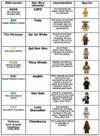Did you mean the word Yahweh, the literal nature of the translation, or both?I am reading Psalms in the LSB out loud with my wife before bed, and I admit I am finding it a bit jarring.
Just as well the CSB changed from Yahweh in the HCSB (in some places), or you would only have one "like" point for the CSB, Stephen
I heard you have become an elder in the New Plymouth church. That was a blessing to hear, as well as the good numbers coming into membership recently. God is good.


